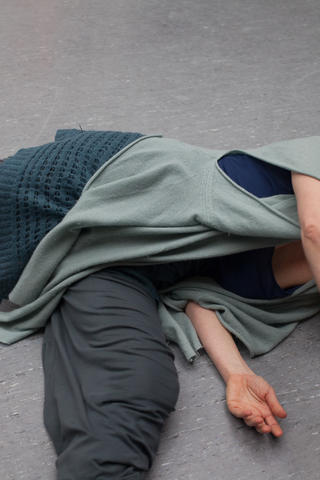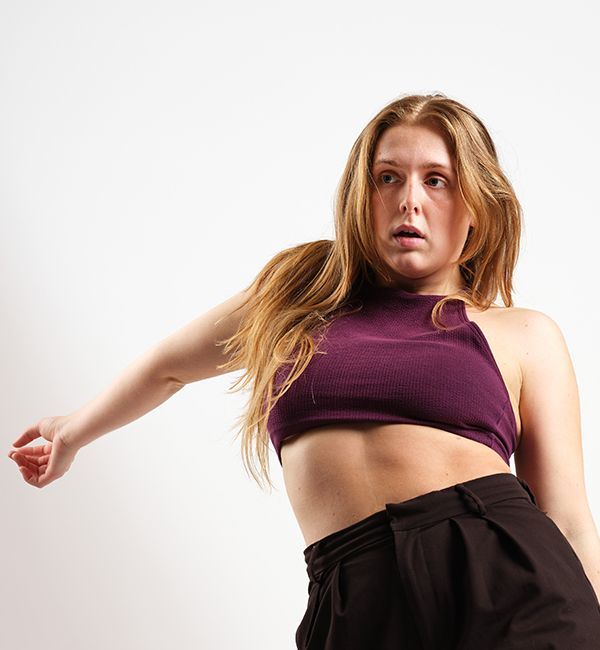
Modern Dance
Instructors

Carlo Melis
Carlo Melis is among the most longstanding teachers at tanzhaus nrw. He has been teaching modern and jazz dance at the house since 1989, integrating influences from contemporary dance. “Contemporary dance’s freedom challenges standardised techniques in modern and jazz dance, turning the gaze inward.” Accordingly, Carlos’ classes focus less on learning a technique but rather on rediscovering a strategy we have been carrying within from our earliest childhood movements: Being curious, experiencing oneself and one’s body, feeling one’s own emotions. The participants work on movements, but also always on their origins. “We only start dancing when emotions drive movements.” Carlo entered vocational training to become a construction engineer for the sake of his parents, yet he has been fascinated by the arts early on in his youth, playing in physical theatre and in Living Theatre. Following a workshop with Bob Curtis, a pioneer in Afro contemporary dance, Carlo discovered dance: “I had never experienced such intensity. From that moment on, I knew that I wanted to dance.” So, he started studying classical ballet, modern and jazz dance in his homeland of Sardinia at age 26. Later, he also graduated with a degree in theatre and dance education from several Italian universities. During a dance scholarship at the Folkwang University of the Arts, Carlo received tuition by great Wuppertal choreographer Pina Bausch, an experience that influenced his subsequent dance works. He contributed to TV productions, worked with numerous companies and taught at Arnhem University as well as elsewhere.

Colin Sinclair
Colin Sinclair is a creative multi-talent. The Londoner is not only a dancer, choreographer and lecturer, he is also the designer for his own fashion label and the artistic director behind Theater Company Sinclair Arts. He was active as a model for name brands, later founding a creative talent agency. He also won a number of awards as a screenwriter and graduated from New York Film Academy. His most formative dance experiences were gathered in London underground clubs. He was selected by the judging panel at a Covent Garden dance event, and they invited him to study at the Urdang Academy of Ballet and Performing Arts in London. Following this, Colin worked as a singer and dancer in numerous TV shows and musicals, among them Peter Maffay’s “Tabaluga und Lili” with a stint from 2000 until 2003. As a choreographer, Colin also worked for one of the largest US-American broadcasting and film production companies. Colin now teaches throughout Europe and has been a tanzhaus nrw instructor since 2005.

Elisa Marschall
Elisa Marschall ist eine deutsch-nicaraguanische zeitgenössische Tänzerin, Performerin, Choreografin sowie Tanz-, Yoga- und Theaterpädgogin. Sie absolvierte ihr Tanzstudium an der Folkwang Universität der Künste in Essen und an der ArtEZ Hogeschool voor de Kunsten in Arnheim (Niederlande). Bisher hatte sie Gelegenheit mit Regisseur*innen und Choreograf*innen wie Susanne Linke, Anna Holter, Maura Morales, Philipp Stölzl, Andreas Rosar, Carlus Padrissa sowie mit artcenisco performing arts, Sepidar Theater und das Theater der Klänge u.a. zusammen zu arbeiten. Im Jahr 2014 zertifizierte sie sich in Indien zur Yogalehrerin. Seitdem unterrichtet sie leidenschaftlich gerne Gruppen sowie einzelne Personen. 2020 absolvierte sie eine Ausbildung zur Theaterpädagogin in BuT® an der Akademie off-theatre in Neuss. Seit 2021 ist sie Mitglied des Forumtheaters Inszene in Köln, wo sie als Schauspielerin sowie Moderatorin in der kulturellen Bildung tätig ist. Derzeit absolviert sie neben ihrer künstlerischen Tätigkeit einen Master in Szenischer Forschung an der RUB.

Ivan Keim
Ivans Unterrichts besteht aus einem technisch anspruchsvollen Training, welches den Teilnehmer*innen ermöglicht, ihren Körper und ihre Bewegungen zu „kontrollieren und gleichzeitig loszulassen“. Ivan hat seine Kurse für das tanzhaus nrw im Januar 2021 angefangen. Laut ihm „Die Motivation und Leidenschaft jeder Gruppe zu erkennen berührt mich immer! Es gibt viel positive Energie, die jede*r einzelne in den Kurs mitbringt.“ Ivan Keim ist in Mendoza (Argentinien) geboren und aufgewachsen. Er erhielt seine Ausbildung zum Tänzer an der UNA – National Art University und am National Ballet & Modern Dance Konservatorium in Buenos Aires. Auf sein erstes Engagement beim Argentine National Ballett folgten weitere als Tänzer in verschiedenen Bereichen und Stilen – von Modern Dance Companies über TV-Shows bis zu Werbeaufnahmen. Nach seinem Umzug von Südamerika nach Europa tanzte Ivan u. a. für die Deutsche Oper am Rhein, die Oper Köln, das Theater Bonn, die Oper Dortmund, die Oper Wuppertal und das Saarländische Staatstheater in Saarbrücken. Seit 2018 arbeitet er auch als Choreograf - Produktionen für Balletts und Dance Companies (Estland / Deutschland), sowie für Musicals, Operetten, Galas und unterschiedliche Produktionen. Heute arbeitet Ivan hauptsächlich als Tänzer, Tanzdozent und Choreograf und folgt dem Credo: „Ich habe das Bestreben meine Expertise im Tanzbereich stetig weiter zu entwickeln.“

Ivana Kisic
Ivana Kisic is a freelance dancer and dance pedagogue with Croatian roots. She started out doing classical ballet in her youth, later dancing in shows and taking part in numerous competitions. Following her studies at ArtEZ University of Arts in Arnhem to become a dance pedagogue, she was in charge of the children, youth and adult sections of several dancing schools in Düsseldorf and the Ruhr Area. Ivana has also been teaching at tanzhaus nrw since 2007. She was part of the tanzhaus project “Take-Off: Junger Tanz” and took the stage as a performer in the production “the common people” by Belgian choreographer Jan Martens, also at tanzhaus nrw.

Joseph P. Cooksey
Dance educator Joseph P. Cooksey deploys Zena Rommett Floor-Barre Technique®, modern dance, modern ballet and jazz in his classes. He taught at the Juilliard School, at the Dance Theater of Harlem, at the Alvin Aily American Dance Center and at the Philadelphia College for the Performing Arts. He is a certified Zena Rommett Floor-Barre Technique® teacher as well as a Master Teacher at their respective annual certifications.

Mina
Minas Leidenschaft als Tänzerin und Lehrerin entspringt ihrer lebenslangen Obsession für Bewegung und Musik und diese, vereint in verschiedensten Situationen, zu erleben und zu geniessen – was sie im Laufe ihrer Zeit immer näher zu ihrem Beruf als Tanzkünstlerin führte. Mit dem Tanzen begann Mina früh in den Balletstudios von Sonja Bjerke und Olivia Lindig. Später begann Mina neben dem klassischen Ballet die Stile Contemporary, Dancehall und Modernen Tanz wöchentlich zu trainieren. Nach dem Abitur 2018 war schnell entschlossen, dass der Weg weiter Richtung Tanz geht. Von 2018 bis 2022 studierte Mina an der ArtEZ University of the Arts in den Niederlanden Tanz, Choreografie und Pädagogik und tanzte in verschiedenen Stücken und Produktionen mit. Während ihrer Studienzeit konzentrierte sie sich vor allem auf das Entdecken ihrer eigenen Tanzsprache und erlangte professionelles Training in den Stilen Ballet, Modern Dance, Contemporary Floorwork und Jazz Dance. Im letzten Jahr ihres Studiums spezialisierte Mina sich auf das interdisziplinäre Arbeiten mit professionellen Tänzern*innen und Musiker*innen um beide Disziplinen durch Improvisation in Relation zueinanderzusetzen. Gegenwertig tanzt und unterrichtet Mina hauptsächlich in Köln und Umgebung. Sie unterrichtet in den Stilen Urban Contemporary, Floorwork, Improvisation und Modern Dance.

Nora Pfahl
Nora Pfahl graduated from her dance studies at ArtEZ University of Arts in Arnhem. She passionately danced ballet, modern and jazz dance from an early age. Since her graduation, she has been working internationally as an instructor, dancer and choreographer. Apart from her numerous freelance artistic works, she is also in demand as a choreographer for TV station KiKa, Junges Schauspielhaus, Tonhalle and tanzhaus nrw in Düsseldorf. Since 2006, Nora has been an instructor at tanzhaus nrw. “I am very happy to be able to do exactly what I love.” Her acting debut – following her childhood’s second dream job – was as the Red Riding Hood in Düsseldorf theatre collective Pièrre.Vers’ production of “Rrr.käppchen”. The collective also takes part in Düsseldorf’s Asphalt Festival and düsseldorf festival! annually. Additionally, Nora choreographs and hosts the “Plutino” series at Tonhalle Düsseldorf, a work within the frame of “Take-off: Junger Tanz”, initiated by tanzhaus nrw.

Sofia Klein Herrero
Sofia Klein Herrero was born in Düsseldorf and received her dance training at the Escuela de Ballet Carmina Ocaña y Pablo Savoye in Madrid, as well as at the Conservatorio Superior de Danza María de Ávila de Madrid, where she completed a Bachelor in Choreography and Dance in 2018. Sofia has danced in numerous ballet companies and theatres (Aalto Ballett Essen, Deutsche Oper am Rhein, Oper Wuppertal, Ballett Bautzen, Musik Theater im Revier Gelsenkirchen, Pasodos Dance Company Mallorca, and many more).
Her work as a dance teacher includes various dance schools, workshops and companies where she taught different styles: ballet, contemporary, modern dance, pointe, creative children's dance, preballet, stretching, improvisation technologies, choreography, as well as yoga, pilates, balletfit and body conditioning. Since 2020 she is studying a Master in Dance Education (Classical Dance) at the Folkwang University of the Arts Essen. Sofia Klein Herrero works as a dancer, dance teacher, choreographer and fitness trainer.

Tanja Emmerich
Tanja Emmerich started dancing ballet at age eight. Later on, she took additional classes in modern dance and jazz with Carlo Melis and others. As a youth, she discovered the variety on offer at tanzhaus nrw and took even more classes in jazz dance and hip hop. Tanja studied at the ArtEZ University of the Arts in Arnhem and completed her dance pedagogy studies at the Weber-Schule in Düsseldorf. Following this, she obtained a certificate as a dance pedagogue at the Ballettseminar Stuttgart under the direction of Eva Steinbrecher. She has been teaching children, youths and adults in different dance styles while also working regularly as a choreographer for dance and theatre productions such as the Neusser Musical-Wochen. She has been a member of the core instructional team at tanzhaus nrw since 2015.




